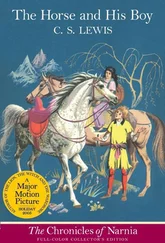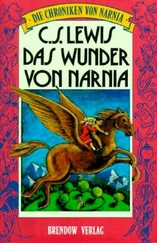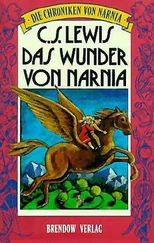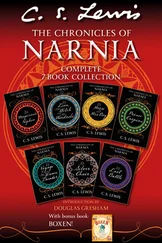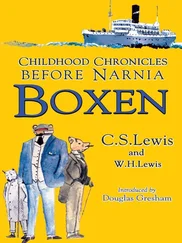‘By the Furioso 93 out of the Commedia’ is not far wrong. My real model was David Lyndsay’s Voyage to Arcturus wh. first suggested to me that the form of ‘science fiction’ cd. be filled by spiritual experiences. 94 And as the Furioso was in some ways the science-fiction of its age, your analogy works. But mind you, there is already a science-fiction element in the Commedia: e.g. Inferno xxxiv 85-114.
It’s fun laying out all my books as a cathedral. Personally I’d make Miracles and the other ‘treatises’ the cathedral school: my children’s stories are the real side-chapels, each with its own little altar.
No, I never read Perceforest . 95 The only O.R 96 prose romance I’ve read is Balain . 97 How lovely, how like water–or Grace–that limpid O.E prose is. Damn the Renaissance.
I return cordially your wishes for a blessed Easter.
Yours
C. S. Lewis
TO JOHN GILFEDDER(W): 98
Magdalen College
Oxford
30/iii/53
Dear Gilfedder
(I wish you’d call me Lewis not Sir) Thanks both for card of Florence and for your letter of the 15th.
I think a glossarial Index (I call it that because your specimens are partly index as well as glossary) wd. be a most useful addition to C.W.’s cycle. 99 But the chances of the O.U.P. ever re-printing Taliessin , let alone adding any matter to the volume, are infinitesimal. They wd. only do that if it showed signs of becoming a popular success: which of course it doesn’t.
I am glad you are settled down and hope you are enjoying your work. Please remember me to your wife; all good wishes to both for a happy Easter.
Yours
C. S. Lewis
TO MARY WILLIS SHELBURNE (W):
Magdalen College
Oxford
31/3/53
Dear Mrs. Shelburne
I’ve no time for a proper letter today but this is just a scrape of the pen to thank you for yours of the 27th and to wish you a v. blessed Easter. I expect Jeannie will grow up the most devoted grand-daughter ever. Your silly son-in-law doesn’t realise the charm of forbidden fruit: a grandmother one is forbidden to see rises almost into the status of a fairy godmother!
Apropos of horrid little fat baby ‘cherubs’, did I mention that Heb. Kherub is from the same root as Gryphon? That shows what they’re really like!
Yours
C. S. Lewis
TO SISTER PENELOPE CSMV(BOD):
Magdalen
1/4/53
Dear Sister Penelope
I am simply delighted with The Coming of the Lord; 100 delighted, excited, and most grateful. I think it is the best book you have yet done, and the best theological book by anyone I have read for a long time. (You are, among other things, the only person I ever meet who gives me real light on the Old Testament). Chap VIII now convinces me completely.
I was talking nonsense when we last discussed this matter: I hadn’t really grasped the point that Man is the true Temple. That is a splendid bit on p. 76 101 about the true sense of ‘it is finished’-the sword ‘finished’ when its life as a sword can begin) 102 How did you think of it? Why did all the rest of us non And the explanation on p. 26 of why the Bride is never mentioned, is brilliant. 103 Indeed, I’ll say it is clever -why should we acquiesce in that word’s sliding into a contemptuous meaning. And many, many thanks for St. Bernard’s conception of the Palm Sunday procession. 104 And the daring use of larval at the bottom of p. 45 is a complete success: I wanted to clap my hands when I came to it. 105
Now for a few tiny flaws, or what I think to be such.
P. 3. ‘Expectation , therefore, is a specifically human exercise.’ 106 Yes, in the peculiar sense you give it of ex-spectation . But you haven’t explained that yet, have you? Won’t the reader take it in the current sense of  107 and say that ‘expectation’, far from being specifically human, is seen at its v. maximum in a dog waiting to be taken for a walk or to have a ball thrown for it?
107 and say that ‘expectation’, far from being specifically human, is seen at its v. maximum in a dog waiting to be taken for a walk or to have a ball thrown for it?
P. 5. at top. Basis or foundation wd. for many reasons be a better word than fundament . 108
P 5 later. Oh, oh why should an attitude almost impossible to a Pagan be called ‘neo-Paganism’? 109 You know that no Pagan, bless him, wd. ever have dreamed of thinking the sky belonged to Man. They had their faults, but that is just the sort of sin they never committed. They had too much αίδώσ, 110 and δειδαιμονα, 111 and all that. You are falling into the common error of equating the post-Christian with the pre-Christian. They are as different as an unmarried girl is from a woman who has deserted her husband.
P. 44. Here I’m not sure, but, as the barristers say, I ‘put it to you.’ Can we take χóσμον 112 to mean Universe (as dist. from Earth) in view of other Johannine uses of it? But you are so often right that I dare say you will convince me on this point too.
Anyway, it is a lovely little book. I am very much in your debt. All blessings.
Yours sincerely
C. S. Lewis
TO CORBIN SCOTT CARNELL (W): 113
Magdalen College
Oxford
5/4/53
Dear Mr. Carnell
I am myself a little uneasy about the question you raise: 114 there seems to be almost equal objection to the position taken up in my footnote and to the alternative of attributing the same kind and degree of historicity to all the books of the Bible. You see, the question about Jonah and the great fish does not turn simply on intrinsic probability. The point is that the whole Book of Jonah has to me the air of being a moral romance, a quite different kind of thing from, say, the account of K. David or the N.T. narratives, not pegged , like them, into any historical situation.
In what sense does the Bible ‘present’ this story ‘as historical’? Of course it doesn’t say ‘This is fiction’: but then neither does Our Lord say that His Unjust Judge, Good Samaritan, or Prodigal Son are fiction. (I wd. put Esther in the same category as Jonah for the same reason). How does a denial, or doubt, of their historicity lead logically to a similar denial of N.T. miracles?
Supposing (as I think is the case) that sound critical reading reveals different kinds of narrative in the Bible, surely it wd. be illogical to conclude that these different kinds shd. all be read in the same way? This is not a ‘rationalistic approach’ to miracles. Where I doubt the historicity of an O.T narrative I never do so on the ground that the miraculous as such is incredible. Nor does it deny ‘a unique sort of inspiration’: allegory, parable, romance, and lyric might be inspired as well as chronicle. I wish I could direct you to a good book on the subject, but I don’t know one. With all good wishes.
Yours sincerely
C. S. Lewis
TO MARY VAN DEUSEN (W):
Magdalen College,
Oxford.
6/4/53
Dear Mrs. Van Deusen
I think our official view of confession can be seen in the form for the Visitation of the Sick where it says ‘Then shall the sick person be moved (i.e. advised, prompted) to make a…Confession…if he feel his conscience troubled with any weighty matter.’ That is, where Rome makes Confession compulsory for all, we make it permissible for any: not ‘generally necessary’ but profitable. We do not doubt that there can be forgiveness without it. But, as your own experience shows, many people do not feel forgiven, i.e. do not effectively ‘believe in the forgiveness of sins’, without it. The quite enormous advantage of coming really to believe in forgiveness is well worth the horrors (I agree, they are horrors) of a first confession. 115
Читать дальше
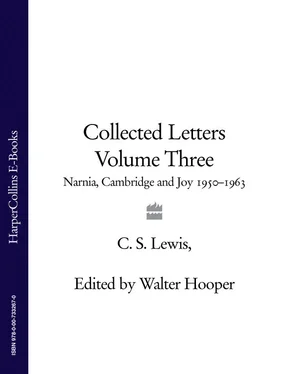
 107 and say that ‘expectation’, far from being specifically human, is seen at its v. maximum in a dog waiting to be taken for a walk or to have a ball thrown for it?
107 and say that ‘expectation’, far from being specifically human, is seen at its v. maximum in a dog waiting to be taken for a walk or to have a ball thrown for it?